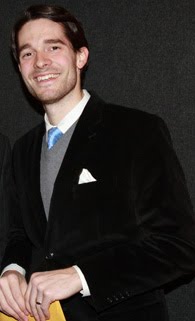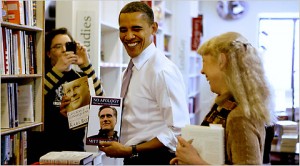Publishing Talks: David Wilk interviews Jason Allen Ashlock
May 31, 2010 by David
Filed under PublishingTalks, The Future
 In this series of interviews, called Publishing Talks, I have been talking to book industry professionals about the future of publishing, books, and culture. This is a period of disruption and change for all media businesses. How will publishing evolve as our culture is affected by technology, climate change, population density, and the ebb and flow of civilization and its economics? Publishing Talks interviews help us understand the outlines of what is happening, and how we might ourselves interact with and influence the future of publishing as it unfolds.
In this series of interviews, called Publishing Talks, I have been talking to book industry professionals about the future of publishing, books, and culture. This is a period of disruption and change for all media businesses. How will publishing evolve as our culture is affected by technology, climate change, population density, and the ebb and flow of civilization and its economics? Publishing Talks interviews help us understand the outlines of what is happening, and how we might ourselves interact with and influence the future of publishing as it unfolds.
These interviews give people in the book business a chance to talk openly about ideas and concerns that are often only talked about “around the water cooler,” at industry conventions and events, and in emails between friends and they give people inside and outside the book industry a chance to hear first hand some of the most interesting and challenging thoughts, ideas and concepts being discussed by people in the book business.
I first read about the new literary agency, Movable Type Literary Group established by Jason Ashlock and his partner Meredith Dawson a few months ago. I’ve wondered for awhile now about the role of agents in the changing landscape of book publishing, and evidently so have Jason and Meredith. Along with an NEA based graph on their home page “Books are not dead,” they have composed the following statement of purpose and occasion:
“We have arrived, as Harold Bloom might say, belatedly.
The scene is established, the paradigms rigid, the machine stubborn and aging. Now more than half a millennium removed from the prima typographicae incunabula, “the first infancy of printing,” a chorus now announces the swift and coming death of the published word and the end of book history. But crisis and opportunity are concurrent, and the instability of one paradigm leads to the creation of another. We work in publishing at a moment of both belatedness and birth, when the trend of all future events is being determined. We aim, with many of our friends and colleagues, to confront the crisis of the moment and from the upheaval to design and shape a future.”
When I ran across Jason at a publishing event in Manhattan, we arranged to talk. I wanted to hear in his own words what this new agency will be all about. I think alot of what he says here will resonate for listeners of this podcast. Certainly, it makes sense for the role of the agent to be transformed, and to help lead the transformation of relationships between author, publisher and audience that is emerging now. It looks like Movable Type has an opportunity to create a new model for its own clients, and by example, for others as well. Maybe because, like many others looking at an established industry with new eyes, Jason Ashlock has an opportunity to create a new paradigm.
Podcast: Play in new window | Download
Publishing Talks: David Wilk interviews Eoin Purcell
May 21, 2010 by David
Filed under Ebooks and Digital Publishing, PublishingTalks, Technology, The Future
 In this series of interviews, called Publishing Talks, I have been talking to book industry professionals about the future of publishing, books, and culture. This is a period of disruption and change for all media businesses. How will publishing evolve as our culture is affected by technology, climate change, population density, and the ebb and flow of civilization and its economics? Publishing Talks interviews help us understand the outlines of what is happening, and how we might ourselves interact with and influence the future of publishing as it unfolds.
In this series of interviews, called Publishing Talks, I have been talking to book industry professionals about the future of publishing, books, and culture. This is a period of disruption and change for all media businesses. How will publishing evolve as our culture is affected by technology, climate change, population density, and the ebb and flow of civilization and its economics? Publishing Talks interviews help us understand the outlines of what is happening, and how we might ourselves interact with and influence the future of publishing as it unfolds.
These interviews give people in the book business a chance to talk openly about ideas and concerns that are often only talked about “around the water cooler,” at industry conventions and events, and in emails between friends. I believe these interviews give people inside and outside the book industry a chance to hear first hand some of the most interesting and challenging thoughts, ideas and concepts being discussed within the industry.
Eoin Purcell works and lives in Dublin, Ireland. He is a publishing industry analyst and commentator. He runs Green Lamp Media, a publishing and publishing services company and also edits Irish Publishing News.
He has worked as Commissioning Editor with one of Ireland’s oldest independent publishers Mercier Press and at Nonsuch Ireland (now The History Press Ireland). He writes occasional blog posts and columns on the Irish book trade for The Bookseller magazine.
I was prompted to talk to Eoin by his persuasive and cogent article that appeared in (Ed Nawotka’s highly recommended online newsletter) Publishing Perspectives called “E-Books are a Cul-de-sac: Why Publishing Needs to Rethink its Digital Strategy.” In my view, Eoin consistently thinks and writes clearly about the unfolding future of a digital publishing future. In this conversation we talked mainly about how publishers (and authors) can and must adapt to the emerging environment created by new technology (and new distribution models), including practical ideas and actions they can take to embrace new tools and methods of reaching readers in a profitable way. He expressed his view that publishers need to focus on longer term trends, the values they can provide to readers (and writers) and then build their businesses around identifiable communities of readers. We also talked about the differences in marketing paradigms that digital publishing establishes for publishers, the idea of “publishing as community” and much more.
Eoin provides a fresh, incisive perspective along with realistic ideas and strategies for publishers who want to embrace a new paradigm of publishing based on a web-centric environment. I think this conversation will be valuable to anyone (publisher or author) who is interested in creating a successful digital strategy for the long term future.
Podcast: Play in new window | Download
Publishing Talks: David Wilk interviews Jason Epstein
May 10, 2010 by David
Filed under Publishing History, PublishingTalks, Technology, The Future
 In this series of interviews, called Publishing Talks, I have been talking to book industry professionals about the future of publishing, books, and culture. This is a period of disruption and change for all media businesses.
In this series of interviews, called Publishing Talks, I have been talking to book industry professionals about the future of publishing, books, and culture. This is a period of disruption and change for all media businesses.
How will publishing evolve as our culture is affected by technology, climate change, population density, and the ebb and flow of civilization and its economics? Publishing Talks interviews help us understand the outlines of what is happening, and how we might ourselves interact with and influence the future of publishing as it unfolds.
These interviews give people in the book business a chance to talk openly about ideas and concerns that are often only talked about “around the water cooler,” at industry conventions and events, and in emails between friends. I believe these interviews give people inside and outside the book industry a chance to hear first hand some of the most interesting and challenging thoughts, ideas and concepts being discussed within the industry.
Jason Epstein has led one of the most creative careers in book publishing of the past half century. In 1952, while a young editor at Doubleday, he created Anchor Books, which launched the so-called ‘paperback revolution’ and established the trade paperback format. In the following decade he became cofounder of The New York Review of Books. In the 1980s he created the Library of America, the prestigious publisher of American classics, and The Reader’s Catalog, the precursor of online bookselling. For many years, Jason Epstein was editorial director of Random House. He is the recipient of many awards, including the Curtis Benjamin Award of the American Association of Publishers for inventing new kinds of publishing, the Lifetime Achievement Award of the National Book Critics Circle for creative publishing, and the National Book Award for distinguished contribution to American Letters. As an editor, he worked with many well-known novelists, including Norman Mailer, Vladimir Nabokov, E. L. Doctorow, Philip Roth, and Gore Vidal, and important non-fiction writers as well.
Most recently he has spearheaded the creation of the Espresso Book Machine as co-founder of On Demand Books, and is the author of Book Business: Publishing Past, Present, and Future and numerous articles and essays.
For me it was a great honor and pleasure to talk to Mr. Epstein at his kitchen table, first about his incredible career in publishing, then about his current work with on-demand publishing, and of course, his many ideas about the future of books and publishing, all of which deserve the close attention of all of us who are trying to figure out where books, publishing and literary culture is headed. His vision of the evolving future of the nature of publishing and the value of traditional editorial skillsets will be of particular interest to many listeners.
Podcast: Play in new window | Download
Publishing Talks: David Wilk Interviews Margo Baldwin
April 25, 2010 by David
Filed under Ebooks and Digital Publishing, Publishing History, PublishingTalks, The Future
 In this series of interviews, called Publishing Talks, I have been talking to book industry professionals about the future of publishing, books, and culture. This is a period of disruption and change for all media businesses.
In this series of interviews, called Publishing Talks, I have been talking to book industry professionals about the future of publishing, books, and culture. This is a period of disruption and change for all media businesses.
How will publishing evolve as our culture is affected by technology, climate change, population density, and the ebb and flow of civilization and its economics? Publishing Talks interviews help us understand the outlines of what is happening, and how we might ourselves interact with and influence the future of publishing as it unfolds.
These interviews give people in the book business a chance to talk openly about ideas and concerns that are often only talked about “around the water cooler,” at industry conventions and events, and in emails between friends. I believe these interviews give people inside and outside the book industry a chance to hear first hand some of the most interesting and challenging thoughts, ideas and concepts being discussed within the industry.
Margo Baldwin is the co-founder of Chelsea Green Press, an outstanding and fiercely independent publisher now based in White River Junction, Vermont. We’ve known each other a long time, and over the years, we’ve had opportunities to talk about publishing and politics on many different levels, so this interview is really a continuation of that ongoing conversation about books and ideas, and the role independent publishing can play in making real social change. Chelsea Green’s work extends far beyond the books it publishes, to blogs, websites, video, political movements, and community involvement. The company’s 2003 mission statement is a powerful – and sobering – expression of what a socially engaged publisher might be in the 21st century.
“Indeed, one begins to wonder what “living” really means or will come to mean in the opening decade of the twenty-first century. Can anything be deemed sustainable when life itself–in all its myriad forms–is threatened at so many levels? Is it enough to focus on the how-to of ‘green living’ in the face of such overwhelming force, the ‘shock and awe’ of forest and ecosystem destruction, the rampant plundering of the world’s oceans, the terror of GMO-contaminated-food, and the unintended consequences of biotechnology? We wish to move the company forward boldly and with a new sense of urgency. While continuing our commitment to remain at the forefront of information about green building, organic growing, and renewable energy – the practical aspects of sustainability – we will also publish for a new politics of sustainability, for the cultural resistance that living demands of us now.”
In our Publishing Talks conversation, Margo talks about the history of Chelsea Green, where it is today, and where her vision of publishing will lead the company in the future as it tries to carry out its bold and important mission. The recently announced partnership between Chelsea Green and Vermont’s Northshire Books is a great example of the creative thinking that Margo and her company are practicing.
Podcast: Play in new window | Download
Publishing Talks: David Wilk interviews Ron Hogan
April 18, 2010 by David
Filed under PublishingTalks, The Future
 In this series of interviews, called Publishing Talks, I have been talking to book industry professionals about the future of publishing, books, and culture. This is a period of disruption and change for all media businesses.
In this series of interviews, called Publishing Talks, I have been talking to book industry professionals about the future of publishing, books, and culture. This is a period of disruption and change for all media businesses.
How will publishing evolve as our culture is affected by technology, climate change, population density, and the ebb and flow of civilization and its economics? Publishing Talks interviews help us understand the outlines of what is happening, and how we might ourselves interact with and influence the future of publishing as it unfolds.
These interviews give people in the book business a chance to talk openly about ideas and concerns that are often only talked about “around the water cooler,” at industry conventions and events, and in emails between friends. I believe these interviews give people inside and outside the book industry a chance to hear first hand some of the most interesting and challenging thoughts, ideas and concepts being discussed within the industry.
Ron Hogan has been a very busy guy in the book business over the past fifteen years or so, starting in the book business at the well known and now lamented Dutton’s Bookstore in Los Angeles. He founded Beatrice.com in 1995 (the site is still going strong today as a popular book-centric blog), worked for Amazon, and then for Mediabistro’s Galleycat (“the first word on the book publishing business”), and is now the new Director of E-Marketing Strategy for publisher Houghton Mifflin Harcourt in New York City. If you look him up online, he seems to be everywhere at once, involved in many aspects of publishing, books and new media. It’s difficult to imagine someone more aware of how books and readers interact in the online environment.
Ron is also an author, including The Stewardess Is Flying the Plane!: American Films of the 1970s and most recently Getting Right with Tao: A Contemporary Spin on the Tao Te Ching.
In his new role at HMH, he will now have an opportunity to apply what he knows about marketing and online communities to the practical issues of helping to connect books and readers. In this interview, Ron talked with me about his past work, and particularly what he has learned from his experience in retail bookselling, as well as his extensive online experience, and provides some specific and useful advice for authors (and publishers) to help them thrive in the brave new world of publishing.
Podcast: Play in new window | Download
Publishing Talks: David Wilk interviews Jan Weissmiller
April 8, 2010 by David
Filed under PublishingTalks, The Future
 In this series of interviews, called Publishing Talks, I have been talking to book industry professionals about the future of publishing, books, and culture. This is a period of disruption and change for all media businesses.
In this series of interviews, called Publishing Talks, I have been talking to book industry professionals about the future of publishing, books, and culture. This is a period of disruption and change for all media businesses.
How will publishing evolve as our culture is affected by technology, climate change, population density, and the ebb and flow of civilization and its economics? Publishing Talks interviews help us understand the outlines of what is happening, and how we might ourselves interact with and influence the future of publishing as it unfolds.
These interviews give people in the book business a chance to talk openly about ideas and concerns that are often only talked about “around the water cooler,” at industry conventions and events, and in emails between friends.
I believe these interviews give people inside and outside the book industry a chance to hear first hand some of the most interesting and challenging thoughts, ideas and concepts being discussed within the industry.
Jan Weissmiller recently achieved her fifteen minutes of fame when President Barack Obama visited her store – and the picture of her selling him a book went viral very quickly. But Prairie Lights Bookstore has more going for it than simply being the backdrop for the first citizen’s book buying habit writ large. It’s been a fixture in the strongly literary community of Iowa City since Jim Harris started the store there in the late ’70s.
As times have changed, so has the store, and today Prairie Lights has an active web presence in addition to its longstanding role as “the” local bookstore in one of the great small towns of middle America. I’ve been to the store many times over the years, and deeply admire the vision and care demonstrated first by Jim and Jan, when she was the first employee of the store, and now by Jan and her current wonderful staff of book devotees. Many towns no longer have the opportunity to experience the depth of knowledge that a great bookstore can provide. What Jan and Prairie Lights show us about bookselling is important – people use technology to make life easier, but people need other people to make life meaningful.
In case you missed it, here is the link to the NY Times story about Prairie Lights. And here’s the now famous photo.
Jan Weissmiller was the first employee of Prairie Lights, beginning in 1979, and is now its co-owner.
Podcast: Play in new window | Download
Publishing Talks: David Wilk Interviews Peter Broderick
April 1, 2010 by David
Filed under PublishingTalks, The Future
 In this series of interviews, called Publishing Talks, I have been talking to book industry professionals about the future of publishing, books, and culture. This is a period of disruption and change for all media businesses.
In this series of interviews, called Publishing Talks, I have been talking to book industry professionals about the future of publishing, books, and culture. This is a period of disruption and change for all media businesses.
How will publishing evolve as our culture is affected by technology, climate change, population density, and the ebb and flow of civilization and its economics? Publishing Talks interviews help us understand the outlines of what is happening, and how we might ourselves interact with and influence the future of publishing as it unfolds. These interviews give people in the book business a chance to talk openly about ideas and concerns that are often only talked about “around the water cooler,” at industry conventions and events, and in emails between friends.
I believe these interviews give people inside and outside the book industry a chance to hear first hand some of the most interesting and challenging thoughts, ideas and concepts being discussed within the industry.
Peter Broderick comes from an independent film background and has a perspective that I think is terrifically useful and important. Peter is President of Paradigm Consulting, which helps filmmakers and media companies develop strategies to maximize distribution, audience, and revenues. His work now is completely focused on working with film-makers to utilize new tools in marketing and distribution, and his ideas are very much in concert with my own thoughts about publishing. I strongly recommend reading his article “Maximizing Distribution” and his reports, “Welcome to the New World of Distribution” and “Declaration of Independence;” as concise and spot on as they are for film, they will be useful to anyone thinking about media distribution today and in the future.
I believe there should be more cross-discipline conversations like this one.
Podcast: Play in new window | Download

